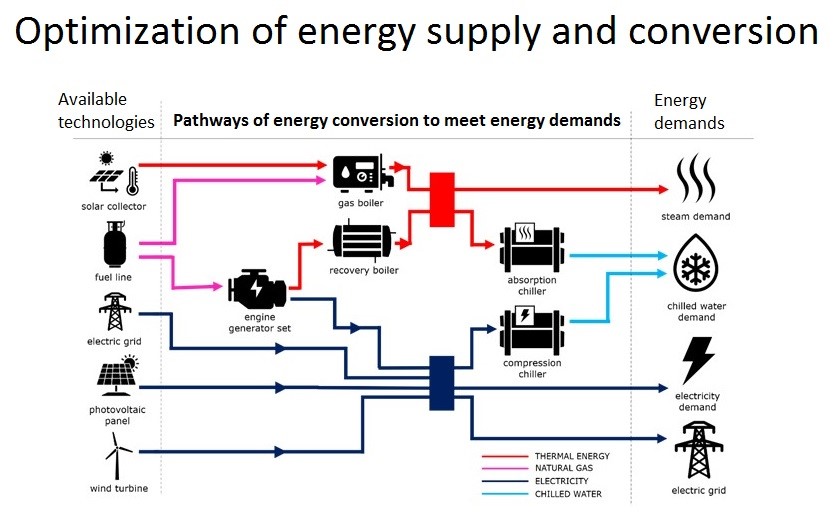Researchers in Brazil have developed an optimization method to couple renewable energy with combined cooling, heat, and power systems (CCHP) in tropical areas. They claim that the model allows for better energy yields than the two technologies can achieve separately, with additional financial and environmental advantages.
“The model is applicable to any region, it should just include different data such as different wind and solar potential data and different energy demands such as heating for comfort purposes, for example, which is not a reality for tropical regions,” Monica Carvalho, a researcher for the Center of Alternative and Renewable Energy at the Federal University of Paraíba, told pv magazine.
The proposed mathematical model is designed to determine the topology and main equipment of a highly complex system featuring wind turbines and PV modules, but also solar collectors, fuel lines, gas boilers, engine-generator sets, recovery boilers, and absorption and compression chillers, as well as grid electricity.
The model uses solar radiation and wind speed data from the Brazilian National Institute of Meteorology (INMET) and collects data on PV power generation, It assumes the use of a 275 W SA275-60P solar module made by Taiwanese manufacturer URE Corp., formerly known as Neo Solar Power. It also considers all the electricity generated by the solar panels and the wind turbine for every month of the year.
“The optimization model allows the purchase of electricity and fuel from the corresponding electric and fuel grids and the export of surplus electricity from renewable energy sources to the electric grid,” the research team said, referring to the possibility of exporting excess power for renewable energy generators under Brazil's net metering scheme.
The optimization method can evaluate how each piece of equipment operates hour by hour and throughout the day and the year. The solar thermal collector has an estimated cost of $414.50/m and the photovoltaic system has been valued at $1,776/kW. The researchers also estimated the cost of a wind turbine at $770/kW and a gas boiler at $90/kW.
The costs of engine-generator sets and recovery boilers have been estimated at $500/kW and $200/kW, respectively, and that of the absorption and compression chillers at $516/kW and $400/kW, respectively. The natural gas tariff was assumed to be $0.476/m3.
Popular content
“The success of the system does not depends exclusively on gas prices but also on climate data and electricity tariffs, as well as on the hourly-seasonal energy demands,” Carvalho explained.
The model works through four different steps: the pre-selection of the equipment, the configuration of all possible equipment combinations, the operational optimization of each configuration, and the identification of the lowest net present value of all configurations.
“Once a specific project or configuration is installed, that configuration can be subject to fluctuation in tariffs,” the Brazilian group said. “Therefore, knowledge of the historical behavior of tariff variations is essential to analyze how the optimal system can behave throughout its lifetime.”
Through this methodology, the academics found that a system based on renewable energy with minimal use of grid electricity is economically feasible, given rising gas and electricity prices.
“The evolution of the residential electricity tariff in Brazil shows an average increase of 6% per year,” they concluded. “Therefore, over the system's lifetime, it is likely that there will be a variation in the electricity tariff.”
They described the model in “Optimization of an integrated combined cooling, heat, and power system with solar and wind contribution for buildings located in tropical areas,” which was recently published in the International Journal of Energy Research.
This content is protected by copyright and may not be reused. If you want to cooperate with us and would like to reuse some of our content, please contact: editors@pv-magazine.com.



By submitting this form you agree to pv magazine using your data for the purposes of publishing your comment.
Your personal data will only be disclosed or otherwise transmitted to third parties for the purposes of spam filtering or if this is necessary for technical maintenance of the website. Any other transfer to third parties will not take place unless this is justified on the basis of applicable data protection regulations or if pv magazine is legally obliged to do so.
You may revoke this consent at any time with effect for the future, in which case your personal data will be deleted immediately. Otherwise, your data will be deleted if pv magazine has processed your request or the purpose of data storage is fulfilled.
Further information on data privacy can be found in our Data Protection Policy.